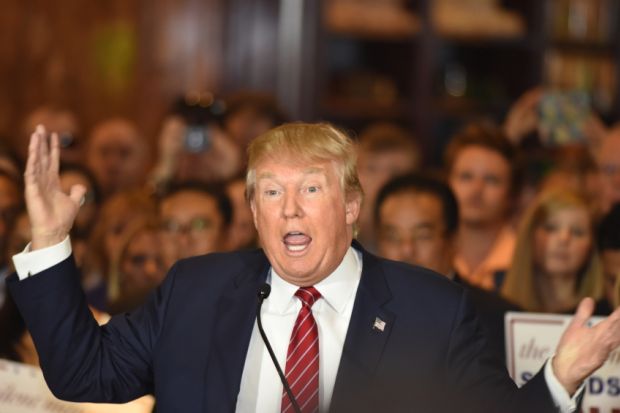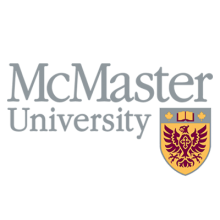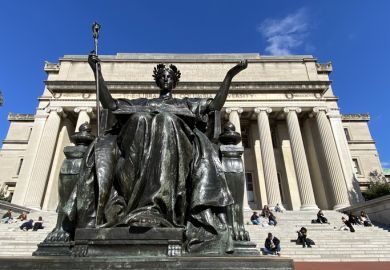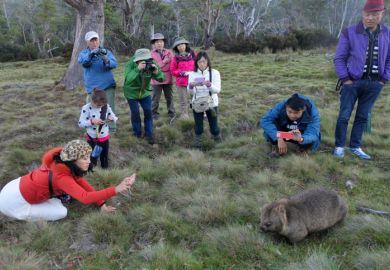Yesterday, we reported on the remarkable pace at which university leaders across the US responded with outrage to persident Donald Trump's travel ban on immigrants and non-immigrant visitors from seven Muslim-majority countries.
You can read what they had to say here. Seldom has an event prompted such speedy and widespread condemnation from the sector.
This outrage has not been restricted to US institutions. As the comments below show, Trump's actions have sent shockwaves throughout international higher education.
Sir Leszek Borysiewicz, vice-chancellor of the University of Cambridge, UK
"The recent executive order issued by the United States government...is an affront to one of the most fundamental human freedoms. As the head of a university whose staff is actively engaged in research collaborations around the world, I cannot accept a policy that undermines academic freedom, disrupts partnerships, and blocks the pathways to understanding between peoples, faiths and nations.
"As the son of a family of refugees welcomed by Britain after the Second World War, I abhor a discriminatory policy that further endangers the lives of people who have fled conflict and sought sanctuary elsewhere. While we acknowledge that a country must have the right to manage its own borders, this ban is fundamentally at odds with the values of openness, tolerance and evidence-based decision-making that the University of Cambridge stands for."
He added: "We are determined to champion openness, and the free exchange of knowledge across borders. Even as governments around the world seek to curb freedom of movement, the University of Cambridge remains committed to welcoming the best and brightest students and staff – irrespective of their nationality."
Patrick Deane, president of McMaster University, Canada
"The United States ban on travel announced last week is deeply troubling. McMaster joins with universities across Canada and around the world in condemning the targeting of individuals based on nationality or religion and is providing supports to any member of the community who may be impacted by this sudden policy change.
“This is a misguided and harmful step that is unnecessarily disruptive for students, faculty members and other partners. McMaster supports the statement issued by Universities Canada and stands ready to provide assistance to any member of our community who may be adversely impacted. The university continues to monitor the situation as the travel ban is implemented. This is being made more difficult because the ban has been inconsistently interpreted and enforced.
“As an internationally engaged research intensive university, this abrupt change in policy has a chilling impact on individual scholars and their families, and on the important relationships we have carefully built over the years. Our collaborative partnerships allow us to forge important research and educational programs and activities, which are threatened by arbitrary measures such as the one announced last week.”
Sir Steve Smith, vice-chancellor of the University of Exeter, UK
"Without free movement of people and ideas the whole world suffers, and this is why we believe the imposition of travel restrictions by the US government based on nationality both undermines the principle of academic freedom and jeopardises the advancement of knowledge between nations. At Exeter, we collaborate widely with institutions abroad, including in the United States, and we cannot condone a policy that restricts these freedoms, curtails intellectual partnerships or impedes research.
"The ban is already affecting members of our community, and we are deeply concerned that an Iraqi postgraduate student at the University of Exeter has been stopped at an airport as he was about to board a plane to America where he had been invited to present an academic paper along with his professors at a prestigious US institution. The PhD student, who obtained a visa two months ago, has lived and studied in the UK for the past five years.
"We will continue to be a collaborative and diverse community that welcomes people from around the world, regardless of their nationality, and will be actively supporting any staff and students who are affected by the ban."
Ian Jacobs, president and vice-chancellor of the University of New South Wales, Australia
“Universities have a key role as servants of society and the global community to work together encouraging mutual respect, embracing diversity and facilitating collaborative work regardless of race, religion, nationality and gender.
"Open and unrestricted collaboration between universities is vital if the current challenges facing the world are to be addressed and this includes those in the USA. Issues such as fundamentalism, terrorism, refugees, climate change and the spread of communicable disease are borderless and demand international cooperation and collaboration, as does improving the health of the global economy.
“Universities in the USA have led the way on academic cooperation for over 50 years and their role remains crucial. Numerous research programs in Australian and American universities and many others worldwide include visiting researchers with national backgrounds in the banned countries. We also have staff who come from these countries and may be affected."
Professor Jacobs noted that UNSW has "collaborations with 51 institutions in Iran alone and we have produced 175 joint publications with them”.
He said many international students in Australian universities including UNSW could be affected by the US travel bans, and, to date, there has been little clarification of what their position was regarding entry or re-entry into the US.
“Universities have always been beacons of intellectual freedom, and it is distressing that this policy, aimed at America’s internal security, will restrain the exchange of talent across the world, including those between Australia and the United States. As well as having immediate impacts on those affected, this ban if continued will likely inhibit the development of research programs between our two nations, to the long-term detriment of all.”
Oz Hassan, department of politics and international studies, University of Warwick, UK
“The executive order signed by President Trump...is not only ill thought out, it is dangerous. It is the policy equivalent of pouring petrol on a candle, and shows Trump’s lack of understanding on a wide range of domestic and foreign policy issues.
"The circumvention of legal and policy norms in the US, and the resultant scenes at airports demonstrate serious potential for a constitutional show down between the executive, legislature and judiciary. The sole purpose of this Executive Order is to signal intentions to his political base and deliver what was originally intended to be a 'Muslim ban'. Yet in national security terms, this move should and has caused great alarm.
"It is already being used for terrorist recruitment material. It is disproportionate and not aligned with any evidence on the realities around terrorism. Moreover, it has placed the lives of people serving with US and UK forces abroad at serious risk, and therefore those forces themselves.
"Troublingly, this is part of a growing pattern in which the President is eroding US national security institutions and interests, along with the post-World War II international order.”
Lesley Wilson, secretary general of the European University Association
“While President Trump’s security concerns may be justified, this is playing politics with the world’s knowledge pool and with academics’ and students’ lives. A major knowledge economy like that of the US cannot allow itself to be closed off. It is not only ethically wrong, it is also a major obstacle to the vital flow of global talent. Universities are already seeing the consequences for their staff and students, but this is and will be extremely problematic in many sectors.”
More to follow
Register to continue
Why register?
- Registration is free and only takes a moment
- Once registered, you can read 3 articles a month
- Sign up for our newsletter
Subscribe
Or subscribe for unlimited access to:
- Unlimited access to news, views, insights & reviews
- Digital editions
- Digital access to THE’s university and college rankings analysis
Already registered or a current subscriber? Login











